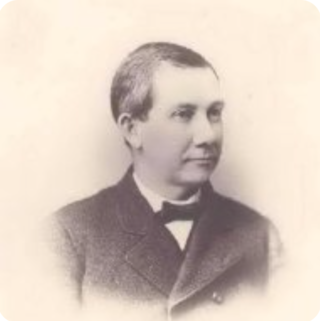Stephen Steele Barlow was an American lawyer and Republican politician. He was the 10th Attorney General of Wisconsin and served four years in the Wisconsin Legislature. He also served several years as a district attorney and county judge.
Charles Henry Larkin, Sr., was an American merchant, real estate developer, and Wisconsin pioneer. He was a member of the Wisconsin State Senate (1866–1870) and State Assembly, representing southern Milwaukee County, and was sheriff of Milwaukee County in 1861 and 1862.
John Carey was an American farmer from Osman, Wisconsin who served as a Democratic member of the Wisconsin State Assembly and the Wisconsin State Senate.

Robert Bland Sanderson was an American businessman, farmer, rancher and politician from Columbia County, Wisconsin who represented part or all of Columbia County in the Wisconsin State Assembly and the Wisconsin State Senate at various times in the 1860s, before moving to Texas and becoming a prominent businessman in Tom Green County.
The Reform Party, also called Liberal Reform Party or People's Reform Party, was a short-lived coalition of Democrats, reform and Liberal Republicans, anti-temperance forces, and Grangers formed in 1873 in the U.S. state of Wisconsin, which secured the election for two years of William Robert Taylor as Governor of Wisconsin, as well as electing a number of state legislators.
Knapp, Stout & Co. was a lumber company based in Menomonie, Wisconsin in the 19th and early 20th centuries. The company was established in 1846, when John Holly Knapp and William Wilson purchased half of interest in a lumber mill on the Red Cedar River from David Black; it was originally known as Black & Knapp. Later Andrew Tainter acquired a quarter-interest, and the company has become Knapp-Tainter Lumber Company. Henry Stout bought a quarter interest in the company in 1853, and its name became Knapp, Stout & Company. The company's location allowed it to control the lumber industry in the region, and by 1870 it controlled the logging industry in the Red Cedar River valley. In 1878, the company incorporated, and its official name became the Knapp, Stout & Co., Company. The company employed over 2,000 workers in the Menomonie area and produced 85 million board feet of lumber on average yearly from 1871 to 1896; its output made it the largest lumber company in the world. In the 1880s, the company expanded to sites along the Mississippi River, opening offices in Dubuque, Iowa, Read's Landing, Minnesota, and St. Louis. By the 1900s, the company had largely depleted its lumber supply; it closed many of its camps and dissolved early in the 20th century. The company sent out its last shipment of lumber on August 12, 1901.
William Earnest Rowe was an American farmer and miller from Arena, Wisconsin who served four one-year terms as a member of the Wisconsin State Assembly.
Herman S. Thorp was an American farmer from Bristol or Cypress, Wisconsin who served as a Free Soil Party member of the Wisconsin State Assembly from Racine County, and a Republican member of the Wisconsin State Senate from the 8th District.
Oliver Horton Lamoreux or Lamoreaux was an American lawyer, politician, and Wisconsin pioneer. He was a member of the Wisconsin State Assembly, representing Portage County during the 1872 session. He was the brother of Silas W. Lamoreux, who served in the Assembly during the same session.

Thomas Robert Wall was an American lumberman, banker, farmer and politician.
Moritz Nathan Becker was a German American immigrant, produce dealer, and politician. He self-identified as a "Progressive Democrat", then "Liberal Democrat", while serving two terms in the Wisconsin State Assembly during the 1870s.
John D. McDonald was an American farmer and politician from Summit, Wisconsin.
Hollis Latham was a Wisconsin farmer and politician.
Carpus E. Loveland was an American farmer from Rutland, Wisconsin who served one term as a Republican member of the Wisconsin State Assembly and held various local offices in his home state of New York and in Wisconsin.
Austin Kellogg was a farmer in Concord, Wisconsin who served three terms as a member of the Wisconsin State Assembly from Jefferson County.
Daniel Cavanagh was a member of the Wisconsin State Assembly and the Wisconsin State Senate.
Gae Leila Magnafici is an American nurse and politician, currently serving in the Wisconsin State Assembly, representing Polk County and part of St. Croix County. A Republican, she was first elected in 2018.
Robert Glenn, Sr. was a pioneer farmer and politician from Wyalusing, Wisconsin, who spent three terms as a member of the Wisconsin State Assembly.
Valentin Johann Knœll [sometimes spelled Valentine; sometimes Knoell, Knoel or Knoll] was an American farmer from Franklin, Wisconsin who served three one-year terms as a member of the Wisconsin State Assembly between the 1850s and the 1870s.
Oliver Samuel Powell was an American farmer, miller and merchant from River Falls, Wisconsin who spent three consecutive one-year terms as a state legislator.

